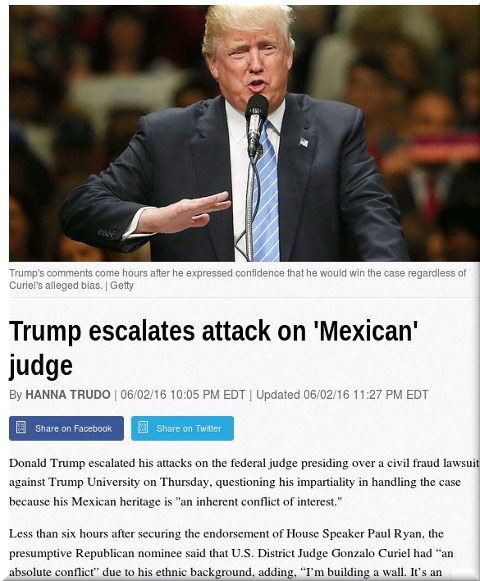

Reference: Trump escalates attack on 'Mexican' judge (this 'Mexican' judge was born in Indiana actually)
"The main decision dealt with the big question about IPRs (whether these were Constitutional)."Not to our surprise, patent extremists still attack this decision. First they attempted to distract from it, now they're back to judge-bashing.
Finnegan, a very large law firm (Finnegan, Henderson, Farabow, Garrett & Dunner, LLP is its full name), does not appear to have said much about these decisions (neither of these). Doris Johnson Hines just went along hyping up Aatrix Software v Green Shades (yet again!) and her colleagues Daniel F. Klodowski, David C. Seastrunk and Michael R Galgano have just spoken about PTAB and IPRs without even bringing up the elephant in the room. Strange. From their outline:
The Patent Trial and Appeal Board issued 67 IPR and CBM Final Written Decisions in March, including decisions following remands from the Federal Circuit, cancelling 760 (83.33%) instituted claims while declining to cancel 121 (13.27%) instituted claims. Patent owners conceded 31 claims (3.40%) through motions to amend or disclaimer in cases reaching a final decision. For comparison, the cumulative average rate of instituted claims cancelled in IPR and CBM Final Written Decisions is about 75%.
Appellee Kamstrup A/S (“Kamstrup”) filed an IPR, and the Board instituted review of the challenged patent. Apator attempted to swear behind a cited prior art reference and submitted an inventor declaration and three emails with attachments to support the earlier conception date. The Board noted that there were no indicia in the body or header of the emails indicating what files were attached or what the attachments disclosed. The Board also noted that the only evidence that a file was attached to these emails was the inventor declaration. Accordingly, the Board rejected Apator’s attempt to swear behind the reference.
On appeal, the Federal Circuit considered whether there was substantial evidence to support the Board’s finding that Apator failed to sufficiently corroborate the inventor’s testimony of conception prior to the effective filing date of the prior art reference.
[...]
Unwitnessed emails and drawings, alone, cannot corroborate an inventor’s testimony of conception.
In light of these decisions, a PTAB challenge may now be a more useful and cost-effective option for companies that are (a) paying a royalty for use of a questionable patent or (b) being prevented from offering a new product or service by a competitor’s questionable patent.
[...]
A company can expect to receive a final PTAB decision on validity within 18 months of filing the IPR petition. However, as discussed above, patent owners often agree to forfeit or narrow their patents early on during the proceeding.
In Oil States Energy Servs., LLC v. Greene's Energy Grp., 584 U.S. ____ (2018), the Supreme Court upheld the constitutionality of the inter partes review (IPR) process before the Patent Trial and Appeal Board (PTAB) of the U.S. Patent and Trademark Office (PTO). Since the enactment of the Leahy-Smith America Invents Act (AIA) in 2011, the PTAB and its administrative law judges have determined the validity of claims in thousands of patents in trial-like proceedings. After its patent was invalidated in an IPR proceeding, one patent owner, appellant Oil States, challenged the statute's delegation of adjudicative authority to the PTO and argued that patents, as properties, could only be revoked by Article III courts. Writing for the 7-2 majority, Justice Thomas held that a patent is the grant of a public right, and IPR "is simply a reconsideration of that grant." Oil States, slip op. at 7. Thus, patent validity can be determined by an agency rather than a court.
[...]
What Oil States Means to You
The Oil States decision was narrowly decided, leaving open the possibility of future challenges to the IPR process; for now, however, it preserves the status quo, in which IPR and other AIA proceedings remain popular vehicles for defendants of patent infringement suits to challenge patents expediently. Notwithstanding Justice Gorsuch's lament in dissent, echoing the late Justice Scalia, that "no doubt, dispensing with constitutionally prescribed procedures is often expedient," id. at 2, the PTAB is expected to remain a primary venue for challenging patent validity, with relatively quick turnaround and experienced administrative judges.